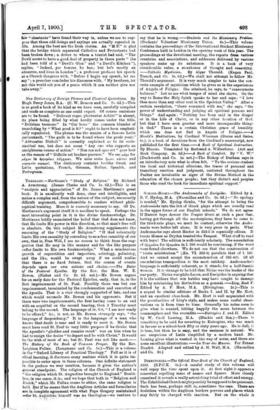THEOLOGY.—Martineau's "Study of Religion." By Richard A. Armstrong. (James Clarke
and Co. Is. 6d.)--This is an " analysis and appreciation " of Dr. James Martineau's great book. It is excellently well done, clear and intelligible, and makes a complex and, from the nature of the subject, necessarily difficult argument, comprehensible to readers without philo • sophical training. More it is scarcely necessary to say. Of Dr. Martineau's argument itself it is needless to speak. Perhaps the most interesting point in it is the divine foreknowledge. Dr. Martineau boldly enunciated the belief that God does not know, that He limits His power in this direction, so that man's free will is absolute. On this subject Mr. Armstrong supplements the reasoning of the "Study of Religion." "If God voluntarily limits His own causality by conceding to us a free causality of our own, that is, Free Will, I see no reason to think from the sug- gestion that He may in like manner and for the like purpose suffer limits to His own foreknowledge." What a mischievous growth of superstition and imposture, astrology, palmistry, and the like, would be swept away if we could realise that there is no fixed future, that the course of events depends upon our own actions and choice.—The Dates of the Pastoral Epistles. By the Rev. the Hon. W. E. Bowen. (Nisbet and Co. 2s. 6d. net.)—Mr. Bowen argues for an early date for the Pastoral Epistles, early, that is, in the first imprisonment of St. Paul. Possibly there was but one imprisonment, terminated by the condemnation and execution of the Apostle. That is a view strongly supported of late, and one which would reconcile Mr. Bowen and his opponents. But if there were two imprisonments, the first having come to an end with an acquittal on the second hearing, then 2 Timothy must belong to the second. The language of iv-. 6.8, " I am now ready to be offered," &c., is not, as Mr. Bowen strangely says, " the language of despondency." It is the language of a man who knows that death is near and is ready to meet it. Mr. Bowen must have read St. Paul to very little purpose if he thinks that the Apostle's "gladder and sunnier mood" was on him when he had to resign the desire " to depart and be with Christ." It would be the wish of most of us ; but St. Paul was not like most.— The History of the Book of Common Prayer. By the Rev. Leighton Pullen. (Longmans and Co. 5s.)—This is a volume in the "Oxford Library of Practical Theology." Full as it is of ritual learning, it discusses many matters which it is quite im- possible to enter upon in these columns. One definite statement in the preface we may mention, because it gives the author's general standpoint. The religion of the Church of England is " the religion which St. Augustine brought to England." Doubt- less, in one sense, it is ; and we hope that both in "Belgium and ZSrich," which Mr. Pullen seems to abhor, the same religion is held. But if he means that the Anglican Articles and formularies are in complete agreement with what Pope Gregory maintained
—for St. Aufsaistine himself was no theologian—we venture to . ,
say that he is wrong.—Students and the Missionary Proiloos (Students' Volunteer Missionary Union. 6a.)—This volume contains the proceedings of the International Student Missionary Conference held in London in the opening week of this year. The proceedings at the devotional meeting, the reports from various countries and associations, and addresses delivered by various speakers make up its substance. It is a book of very considerable value, a storehouse of thought and reasoning. —Catholic Mysticism. By Alger Thorold. (Kegan Paul, Trench, and Co. 3s. 6d.)—We shall not attempt to follow Mr. Thorold's argument. It is very much simpler to take the con- crete example of mysticism which he gives us in the experiences of Angela of Foligno. She attained, he says, to "consumtnate holiness." Let us see what temper of mind she shows. On the way to Rome the Holy Spirit speaks to her and says : " I love thee more than any other soul in the Spoletan Valley." After a certain revelation, "there remained with me," she says, "the power of understanding and judging all spiritual persons and things." And again : "Nothing has been said in the Gospel or in the Life of Christ, or in any other locution of God, but that I have seen greater and more incomparable things in God." There is a certain Christian grace of humility which one does not find in Angela of Foligno.-11 Month's Meditations, by Cardinal Wiseman (Burns and Oates, 4s.), is a book of devotions from the Cardinal's manuscript, now published for the first time.—A Book of Spiritual Instruction. By Blosius. Translated by Bertrand A. Wilberforce. (Art and Book Company. 2e. 6d.)—,4 Book of Comfort. By " V. W." (Duckworth and Co. le. net.)—The Bishop of Durham says in an introductory note what is often felt. " To the serious student the local and historical allusions, the traces of personal and transitory emotion and judgment, scattered throughout the Psalter are invaluable as signs of the Divine Method in the education of the chosen people ; but they disturb and perplex those who read the book for immediate spiritual support."






































 Previous page
Previous page